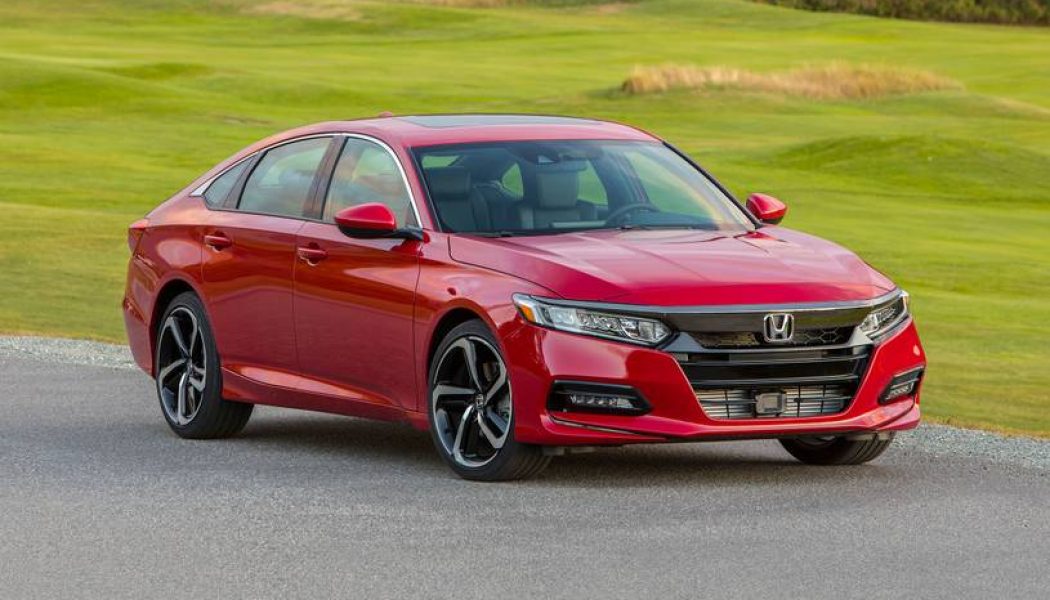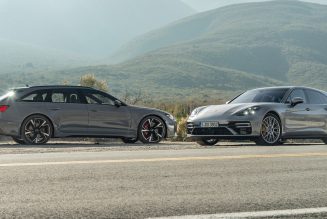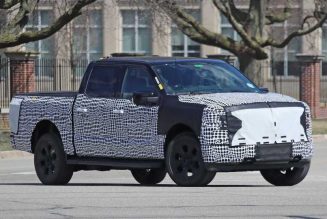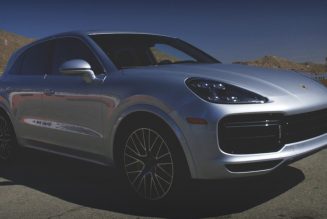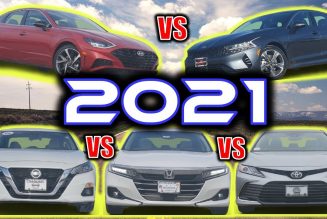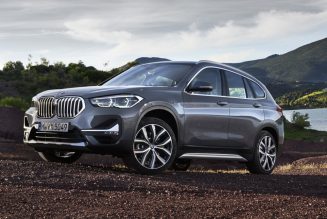The Honda Accord and the Mazda 6 have been the top-ranked midsize sedans at MotorTrend HQ for a long time now, but both are several years into their life cycles. And both now face heavy competition from newer models. The Honda and the Mazda still have plenty to recommend them, but which is aging more gracefully? And which still has what it takes to withstand the stiff competition coming from brand-new models like the Kia K5 and the Hyundai Sonata?
Right up front, we need to address a mismatch: Our Accord for this comparison-test review is an EX-L equipped with the base 1.5-liter turbocharged four-cylinder engine making 192 horsepower and 192 lb-ft of torque. The Mazda 6 we tested is a Turbo Carbon Edition with a 2.5-liter turbocharged four-cylinder good for 227 hp and 310 lb-ft (250 hp on premium gas).
That’s a big gap, and one we couldn’t rectify with the cars Honda and Mazda had available at the time of the test. Honda also sells the Accord with a turbocharged 2.0-liter engine that makes 252 hp and 273 hp, and the Mazda 6’s standard engine is a naturally aspirated 2.5-liter with 184 hp and 185 lb-ft, so the two can certainly be directly compared, and we’ll consider past test results when we discuss performance.
2021 Honda Accord vs. 2021 Mazda 6: Which Is Nicer to Sit In?
Tire-screeching performance isn’t what midsize sedans are about, though. A lot of other considerations are higher on the average buyer’s priority list, and most of them have to do with the inside of the car. Comfort, space, quality, and features matter. It’s here we find the widest gulf between our generally well-matched competitors.
There’s just no getting around the fact the Mazda 6 is getting old. On sale since 2013, it is aging gracefully thanks to standout styling and a pair of updates over the years, but the state of the art has moved on. It’s a sleek, sophisticated look, but it’s betrayed by Mazda’s last-generation infotainment system, lesser-quality materials than what the newer, cheaper Mazda 3 offers, and missing key features.
Mazda has tried to keep up by adding wireless Apple CarPlay and wired Android Auto, but the only two USB ports in the entire car are located under the center armrest where they’re difficult to reach. The infotainment system can be controlled only by the cheap-feeling knob on the center console, and the graphics look 10 years out of date. The little screen shoehorned into the instrument cluster only feels modern because it has color graphics. The head-up display is much easier to read at a glance.
It’s not like this is a base model, either. The Carbon Edition is the second most expensive 2021 Mazda 6 and only short a feature or two compared to the top-shelf model. It isn’t just bells and whistles that are missing, either. It’s also space. While leg room in the front and rear equal the Honda’s, shoulder space is considerably narrower, and it only gets worse in the back. With less leg and shoulder room back there, you can’t help but feel cramped compared to the Honda’s sprawling second row; it’s another fault of the car’s age. Since Mazda designed the 6, higher-strength steels have been developed and have come down in price, allowing automakers to use less total metal and in less bulky configurations, opening up interior space.
This generation of Honda Accord may not be brand new, having hit the road in 2017, but it’s ages newer in car-development terms. As such, it’s hundreds of pounds lighter than the Mazda 6 despite being longer and wider and offering much more interior space. Thanks to its own midterm update, the 2021 Honda Accord is well stocked with the latest gizmos, too.
Front and center is a vastly improved touchscreen infotainment system with real volume and tuning knobs (correcting a previous mistake). Our editors disagreed about how intuitive the system is, but there’s no arguing it looks and functions substantially better than the Mazda 6’s system. It also supports wireless Apple CarPlay and Android Auto. Charging your devices is easy thanks to USB ports and a wireless charger in the storage bin ahead of the shifter plus more ports in the rear seat for those passengers. The folks in back don’t get seat heaters, though, which Mazda’s rear passengers do, but both cars offer them up front.
Honda’s interior design is less emotional than Mazda’s, more mature and reserved than youthful and playful. That’s not a bad thing, and there are still little bits of whimsy like the light rings around the temperature dials that glow red or blue as you turn the temperature up or down.
2021 Honda Accord vs. 2021 Mazda 6: What About Safety?
Both cars get five-star ratings from the government, and they boast Top Safety Pick+ awards from the Insurance Institute for Highway Safety. Each also comes standard with an impressive roster of passive and active driver aids. From the driver’s perspective, though, Honda’s aids are clearly a step ahead. Whereas the behavior of Honda’s lane keeping and adaptive cruise control systems are as good as early Tesla Autopilot, Mazda’s systems react slower and make no effort to keep you centered in your lane, just in it. This is a deliberate choice to preserve steering feel, but leaves the impression of a less-sophisticated system.
How Much Will You Pay for All Those Features?
The real kicker, though, is that everything the Honda does better than the Mazda, it also does for less money. Both are the second-highest trims offered, but the Honda starts at roughly $1,500 less and comes in nearly $2,000 less expensive as tested.
Here’s where it gets tricky. The Mazda’s powerful turbocharged engine is standard equipment from the midrange Grand Touring model up. Getting the more comparable base engine requires giving up a lot of features to get down to the Touring model, but doing so saves you thousands of dollars. On the other hand, you can get an Accord Sport 2.0T with the big engine for the same price as the EX-L and a nearly identical feature set. Go that route, and the Mazda 6 Carbon Edition loses its performance advantage and still costs more.
2021 Honda Accord vs. 2021 Mazda 6: Performance
It’s a substantial performance advantage, too. Making the big engine standard on most trims allows Mazda to claim the mantle of sportiness outright. A full second quicker to 60 mph from a stop, it clearly outmatches the Accord as tested. Take away the turbocharger, though, and the Mazda 6 falls 0.7 second behind the Honda getting up to highway speed. Conversely, giving the Honda its bigger turbo engine option puts it a few-tenths ahead of the turbocharged Mazda.
Upgrading the Honda’s engine also gets you a sportier set of tires and eliminates the Mazda’s other performance advantage: emergency braking from 60 to 0 mph. An Accord Sport stops 13 feet shorter than our EX-L here and 6 feet shorter than the Mazda 6 Turbo. Go the other way with a lower-trim Mazda 6, and the braking distance grows by 5 feet—but still beats the Accord EX-L by 4 feet.
Interestingly, despite the power and tire differences between the Accord EX-L and the Mazda 6 Turbo, the results of our handling tests are nearly the same. They pull the same lateral g on the skidpad, and the Honda is slightly quicker in our figure-eight test, likely owing to its lighter weight and the Mazda’s more aggressive stability control.
But What Are They Like to Drive?
You wouldn’t be so sure behind the wheel, though. There’s an inherent sportiness to the 2021 Mazda 6 Turbo’s driving experience. You feel it in the way the car moves, always confident and in command of the road. The body moves deliberately in corners, the brakes and throttle are immediately responsive, and the steering is nicely weighted and quick to react. It feels built for the MotorTrend reader, a car that puts an unapologetic emphasis on the driving experience. If you care at all about driving, you can’t help but forgive the old tech and the cramped rear seat when you drive the 2021 Mazda 6. The ride is just a bit firm for a midsize sedan, but there’s a clear payoff in handling.
This isn’t to say the 2021 Honda Accord is a boat. In fact, the Accord is very good in a corner. To put a number on it, we’d say it’s 90 percent as sporty as the Mazda. It’s just a little softer, a little slower to react, a little less enthusiastic. There’s a slight delay when you first press the gas or brake pedal before they respond. The body rolls more, and the steering isn’t quite as sharp. It does ride a little softer, but not much. Here again, the Accord feels like the more mature car, but it still delivers a rewarding driving experience, just not as rewarding as the Mazda.
2021 Honda Accord vs. 2021 Mazda 6: Time to Buy
If it isn’t obvious, the 2021 Mazda 6 Turbo and 2021 Honda Accord remain perennial MotorTrend favorites. Whereas the Mazda used to be the pick of the class, though, its age has finally become enough of a liability to make it hard for us to recommend it over the Honda. The Accord has been a consistently solid product forever, and it continues to dominate the midsize segment today. Yes, this EX-L isn’t quite as good a driver as the Mazda 6 Turbo, and that matters to us, but the Accord is darn near close enough and offers far too many other advantages to overlook. Unless driver engagement is your only shopping criterion, there’s just no argument for buying the Mazda 6 over the all-around better Honda Accord.
2021 Honda Accord Pros:
- Lighter
- Roomier
- More mature and refined overall
2021 Honda Accord Cons:
- Not particularly engaging to drive
- Larger engine doesn’t come standard
2021 Mazda 6 Turbo Pros:
- Strong engine
- Sporty driving experience
- Sharp styling
2021 Mazda 6 Turbo Cons:
- Shows its age, especially the infotainment system
- Relatively cramped interior
- Not the best bargain
| POWERTRAIN/CHASSIS | 2021 Honda Accord (EX-L) | 2021 Mazda6 SkyactivG Turbo (Carbon Edition) |
| DRIVETRAIN LAYOUT | Front-engine, FWD | Front-engine, FWD |
| ENGINE TYPE | Turbocharged I-4, alum block/head | Turbocharged I-4, alum block/head |
| VALVETRAIN | DOHC, 4 valves/cyl | DOHC, 4 valves/cyl |
| DISPLACEMENT | 91.4 cu in/1,498 cc | 151.9 cu in/2,498 cc |
| COMPRESSION RATIO | 10.3:1 | 10.5:1 |
| POWER (SAE NET) | 192 hp @ 5,500 rpm | 227 hp @ 5,000 rpm* |
| TORQUE (SAE NET) | 192 lb-ft @ 1,600 rpm | 310 lb-ft @ 2,000 rpm* |
| REDLINE | 6,600 rpm | 6,000 rpm |
| WEIGHT TO POWER | 16.7 lb/hp | 15.5 lb/hp |
| TRANSMISSION | Cont variable auto | 6-speed automatic |
| AXLE/FINAL-DRIVE RATIO | 3.24:1/1.31:1 | 4.09:1/2.45:1 |
| SUSPENSION, FRONT; REAR | Struts, coil springs, anti-roll bar; multilink, coil springs, anti-roll bar | Struts, coil springs, anti-roll bar; multilink, coil springs, anti-roll bar |
| STEERING RATIO | 11.8:1 | 15.5:1 |
| TURNS LOCK-TO-LOCK | 2.3 | 2.8 |
| BRAKES, F; R | 11.5-in vented disc; 11.1-in disc, ABS | 12.6-in vented disc; 10.9-in vented disc, ABS |
| WHEELS | 7.5 x 17-in cast aluminum | 7.5 x 19-in cast aluminum |
| TIRES | 225/50R17 94V Michelin Energy Saver A/S (M+S) | 225/45R19 92W Falken Ziex AE001 A/S (M+S) |
| DIMENSIONS | ||
| WHEELBASE | 111.4 in | 111.4 in |
| TRACK, F/R | 63.0/63.4 in | 62.8/62.4 in |
| LENGTH x WIDTH x HEIGHT | 192.2 x 73.3 x 57.1 in | 191.5 x 72.4 x 57.1 in |
| TURNING CIRCLE | 38.3 ft | 36.8 ft |
| CURB WEIGHT | 3,206 lb | 3,519 lb |
| WEIGHT DIST, F/R | 60/40% | 60/40% |
| SEATING CAPACITY | 5 | 5 |
| HEADROOM, F/R | 37.5/37.2 in | 37.4/37.1 in |
| LEGROOM, F/R | 42.3/40.4 in | 42.2/38.7 in |
| SHOULDER ROOM, F/R | 58.3/56.5 in | 55.9/55.1 in |
| CARGO VOLUME | 16.7 cu ft | 14.7 cu ft |
| TEST DATA | ||
| ACCELERATION TO MPH | ||
| 0-30 | 2.8 sec | 2.4 sec |
| 0-40 | 3.9 | 3.4 |
| 0-50 | 5.4 | 4.7 |
| 0-60 | 7.2 | 6.2 |
| 0-70 | 9.3 | 8.0 |
| 0-80 | 11.9 | 10.0 |
| 0-90 | 14.9 | 12.5 |
| 0-100 | — | 15.4 |
| PASSING, 45-65 MPH | 3.7 | 3.1 |
| QUARTER MILE | 15.5 sec @ 92.0 mph | 14.7 sec @ 97.6 mph |
| BRAKING, 60-0 MPH | 129 ft | 121 ft |
| LATERAL ACCELERATION | 0.82 g (avg) | 0.82 g (avg) |
| MT FIGURE EIGHT | 27.1 sec @ 0.63 g (avg) | 27.3 sec @ 0.63 g (avg) |
| TOP-GEAR REVS @ 60 MPH | 1,700 rpm | 2,000 rpm |
| CONSUMER INFO | ||
| BASE PRICE | $32,285 | $33,745 |
| PRICE AS TESTED | $32,285 | $34,245 |
| STABILITY/TRACTION CONTROL | Yes/Yes | Yes/Yes |
| AIRBAGS | 8: Dual front, front side, f/r curtain, front knee | 6: Dual front, front side, f/r curtain |
| BASIC WARRANTY | 3 yrs/36,000 miles | 3 yrs/36,000 miles |
| POWERTRAIN WARRANTY | 5 yrs/60,000 miles | 5 yrs/60,000 miles |
| ROADSIDE ASSISTANCE | 3 yrs/36,000 miles | 3 yrs/36,000 miles |
| FUEL CAPACITY | 14.8 gal | 16.4 gal |
| EPA CITY/HWY/COMB ECON | 30/38/33 mpg | 23/31/26 mpg |
| ENERGY CONS, CITY/HWY | 112/89 kWh/100 miles | 147/109 kWh/100 miles |
| CO2 EMISSIONS, COMB | 0.59 lb/mile | 0.75 lb/mile |
| RECOMMENDED FUEL | Unleaded regular | Unleaded regular |
| *Regular fuel ratings; 93 octane raises Mazda to 250 hp @ 5,000 rpm and 320 lb-ft @ 2,500 rpm; Nissan to 248 hp @ 5,600 rpm and 273 lb-ft @ 4,000 rpm | ||
